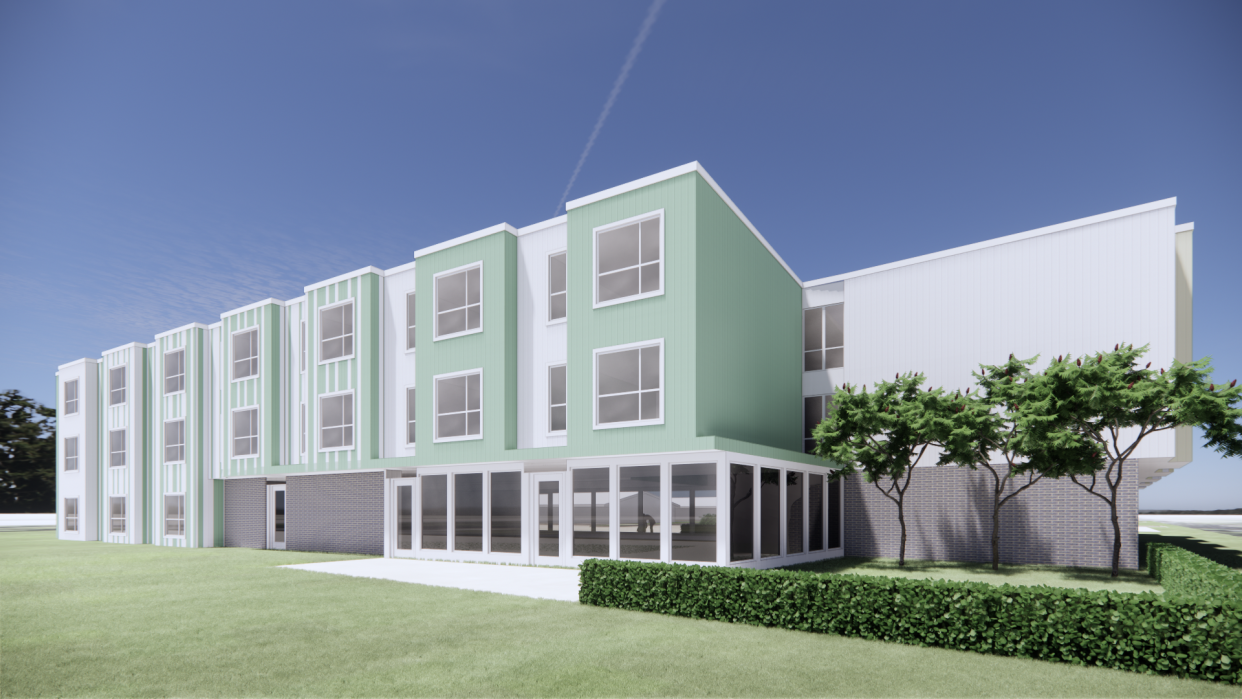One-of-a-kind home for human trafficking survivors to open next month in Columbus

- Oops!Something went wrong.Please try again later.
- Oops!Something went wrong.Please try again later.
On Friday, survivors of human trafficking will walk into their brand new home: a place where each fixture and detail was chosen especially for them by fellow survivors.
The home is Harriet’s Hope — named for abolitionist Harriet Tubman — a 52-unit housing community that can host multiple families and was designed specifically for human trafficking survivors.
The one-of-a-kind community comes out of a public-private partnership that brought together Ohio Attorney General Dave Yost; Columbus Metropolitan Housing Authority (CMHA); CVS Health and OhioRISE, the CVS/Aetna-owned Medicaid program; Beacon 360 Management and many others.
The Dec. 1 opening of Harriet's Hope, a community on Columbus' West Side whose exact location isn't being shared to protect survivor's safety, was announced at the Ohio Statehouse this morning.
A call to action
The project started a few years ago as a vision of Celia Kendall, the CEO of Beacon 360 Management, a nonprofit real estate developer and management firm based in Columbus with 28 communities across Ohio.
Kendall got the idea for Harriet's Hope after being unsettled by what she saw doing street outreach with women being trafficked six years ago.

"I could not just go back and return to life as normal," Kendall said. "Every night when I lay down, when all of us lay down, this whole world awakens where people have no choice but to participate in sex trafficking or labor trafficking."
She realized women are disproportionately affected and began to ask what the need was. By connecting with agencies who work with those who are trafficked, such as Salvation Army Central Ohio, she found out that the biggest need was housing: a safe place for survivors to go after being trafficked.
"Oftentimes that is the thing that allows trafficking to continue," Kendall found. "If your housing is held over your head by your trafficker, it's very difficult to get out of that if you don't have a place to lay your head. This should eliminate that fear."
Kendall set out to answer what she felt was a call to action and approached CMHA and others about the project.
Together they developed Harriet's Hope, believed to be the only affordable, permanent community specifically for human trafficking survivors in the nation.
The importance of housing for human trafficking survivors
Harriet's Hope is part of a larger initiative in the state to end human trafficking and fulfills a critical missing piece — safe, affordable and accessible housing for survivors — in its efforts, said Ohio Attorney General Dave Yost, whose office has a human trafficking commission.
The lack of a safe place to go can make individuals very vulnerable when it comes to human trafficking, according to advocates. In a Polaris Project survey, 64% of trafficking survivors said they were homeless or had unstable housing when they were recruited. Traffickers often recruit directly from shelters, according to the Washington D.C.-based nonprofit organization that works to prevent human trafficking.
Yost's office is fighting to stem the demand for sex trafficking via law changes and other approaches, but places like Harriet's Hope "provide that highway of hope for a survivor to be able to exit the life," he said.
"One of the challenges survivors of human trafficking always face is they are dependent upon their trafficker," Yost said. "Where can they go? How are they going to get help? Where are they going to live? This is an alternative."
The project involved several agencies coming together, not only to fund it but to offer services to survivors, design the community, and more.
CVS Health provided $10.6 million in funding for the approximately $16 million project as part of its goal to address social determinants of health, like the lack of equitable access to housing. Other funders include the Affordable Housing Trust of Columbus, Franklin County, the city of Columbus, state funding and organizations like the Ohio Capital Corporation for Housing.
A lack of housing or access to housing can negatively impact people's health, said Latasha Brown, CVS's first anti-human trafficking administrator.
That's part of the reason the health company, which also owns Ohio's Medicaid program, invested in Harriet's Hope and in other affordable housing projects in Ohio. It has invested nearly $80 million in affordable housing across Ohio since 2020, Brown said.
"A survivor cannot improve their overall well-being without stable access to quality housing," said Brown, who is elated about the opening of Harriet's Hope. "I hope this haven will allow them to focus on their healing journey and position them for their bright future."
Services for survivors
Harriet's Hope is open to any individual — no matter their gender identity or sexual orientation — who has experienced human trafficking or chronic homelessness, meets CMHA's income guidelines for a housing voucher and is ready to make a commitment to sobriety, Kendall said.
Most residents will be identified through the Salvation Army, but referrals can come from anyone, anywhere, she said.
What sets the community apart from others is that the services residents need are embedded within it, Kendall said.
Services include substance abuse disorder treatment by Alvis, case management through the Salvation Army, gender-affirming case management through Kaleidoscope Youth Center, a computer lab furnished by Dell, a food pantry, nutritional services, financial literacy classes, peer support, employment readiness programs, legal aid, health screenings, child care and more.
Residents will start out with a one-year lease before going month to month, Kendall said. Since the goal is that everyone is successfully housed, residents can stay in the community forever, if they want to, she said.
There are 47 fully furnished one-bedroom units and five two-bedroom units meant to provide a place where women can reunite with their children. It's an independent living recovery community and the building — the location of which is not being shared so residents can maintain their safety — will have a property manager, assistant property manager and security. Each resident pays 30% of their income for rent and utilities, meaning if they have no income, they pay nothing.
"I hope that people feel safe, I hope they feel a sense of autonomy, a sense of self, a sense of confidence," Kendall said. "I hope that they feel free. That is truly the spirit through which the project is named, I hope they feel free and all the power that comes from that."
If you suspect someone is a trafficking victim, call The National Human Trafficking 24-hour Hotline at 1(888) 373-7888 to access Central Ohio's local response network.
dking@dispatch.com
@DanaeKing
This article originally appeared on The Columbus Dispatch: Columbus home for human trafficking survivors, Harriet's Hope, to open

